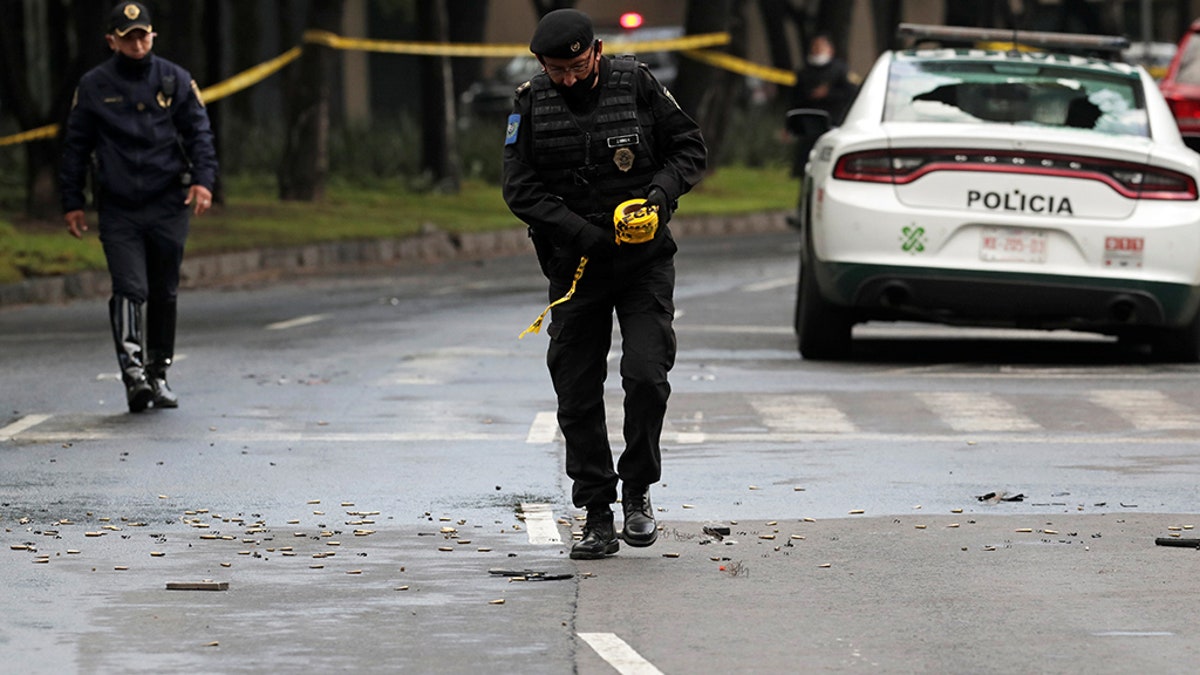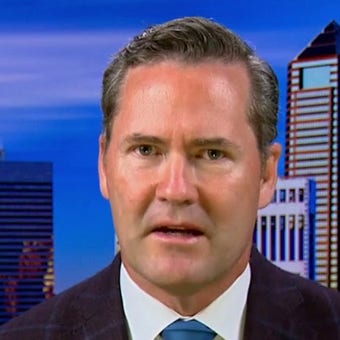Earlier this month, the D.C.-based foreign policy establishment seemed to be aghast by allegations from former Secretary of Defense Mark Esper’s new memoir that former President Donald Trump asked about launching missiles into Mexico to "destroy the drug labs" and take out cartels.
My reaction: we shouldn’t dismiss President Trump’s idea that the time for these drug cartels’ reckoning has come. These cartels have been terrorizing our country for years by importing drugs and violence, as well as playing a part in destabilizing our southern border.
GEN. KELLOGG SLAMS ‘GARBAGE’ CLAIMS BY MARK ESPER

A police officer walks amid ammunition near the scene of a shooting in Mexico City, Mexico, June 26, 2020. (Reuters/Henry Romero)
Foreign policy groupthink has plagued our government in recent years as new crises rise across the globe. One of the benefits of having a disruptor like Donald Trump in the Oval Office was his ability to see things differently and challenge the status quo of Washington.
President Trump asked questions that few thought to ask and demanded results that few in D.C. imagined were possible. He asked, "Why not shift tactics surrounding Middle East peace negotiations to get the results we need?" Toward the end of his administration, Israel, United Arab Emirates and Bahrain had signed the historic Abraham Accords on the South Lawn of the White House.
A similar pattern emerged when he ordered the strike on IRGC Gen. Qasem Soleimani to restore deterrence against the Iran Regime after its proxies attacked our bases and embassy in Iraq. He also recognized Jerusalem as the capital of Israel and moved our embassy there, despite dire warnings from rank and file "experts."
The American people deserve this continued, disruptive approach to our strategy when it comes to our southern border. The threats emanating from cartels in Mexico have brought chaos to our overwhelmed border, destabilized our neighbor Mexico, and unleashed a dire drug epidemic here at home.
According to the Centers for Disease Control and Prevention, over 107,000 Americans died from drug overdoses in the United States last year. A report from Families Against Fentanyl assess the deadly imported drug is the leading cause of death among Americans between the ages of 18 to 45. The killing of thousands of Americans by a foreign substance is a serious national security crisis.
Drug Enforcement Agency Administrator Anne Milgram recently linked Chinese chemical companies who make fentanyl with Mexican drug cartels and asserted "I can say with 100 percent assurance that the criminal drug cartels in Mexico will stop at nothing to get fentanyl into the United States."
Just accepting the status quo will only lead to hundreds of thousands of more dead Americans. It’s time to establish deterrence against the cartels who are terrorizing our communities.
We can do the same with cartels in Mexico just as we did in Colombia with direct U.S. involvement.
Beginning the 1970s, the Revolutionary Armed Forces of Colombia (FARC) began trafficking cocaine to the U.S. to finance its guerilla war against the Colombian government.
What did we do? We helped the Colombian army launch some of the most successful counter-insurgency operations to diminish FARC and other cartel operations to establish more regional stability and stem the flow of drugs. For years U.S. Army special forces "Green Berets" trained government forces in keeping these narco-guerrillas at bay.
With a small presence of U.S. special forces on the ground in Colombia and in other regional neighbors, we advised government forces in patrolling, marksmanship, land navigation, and much more. We need to invest a similar if not more aggressive vigor when it comes to taking on the cartels in Mexico.
Colombia is far from the only example of this precedence in U.S. foreign policy. Nearly 20 years ago, I helped serve in the Pentagon’s counter-narcotics office where I primarily assisted Afghans in taking down drug operations in Afghanistan as the opium trade fueled the rise of the Taliban.
The drug lords of Afghanistan were (and still are) linked to terrorist groups as a financial backbone. It was essential to crack down on these groups as they helped finance terror activities both in the region and around the world in return for regional security to continue drug operations. In 2017, then-President Trump expanded targeted air attacks on Taliban drug labs in an attempt to hurt their revenue from the narcotics trade.
We should apply similar tactics against Mexican cartels to disable their cash flow and operations.
Just last March, American personnel at the U.S. consulate in Nuevo Laredo and their families were forced to evacuate due to an outbreak of cartel violence. This isn’t a far and away location – this a city just south of the Texas border.
The Mexican military and police forces have been unable to contain the cartels, and we should help them.
The Biden administration should press Mexico’s government to allow military advisors into their country to help establish counter-insurgency operations to address the areas of Mexico that have descended into anarchy under control of paramilitary cartels.
CLICK HERE TO GET THE OPINION NEWSLETTER
Proximity to Mexico allows us the capabilities to use our airborne surveillance assets to strike fear into the heart of the cartels. As we demonstrated in 2020 operation to take out Soleimani, we can carry out strikes on high-profile terror leaders with minimal collateral damage. We need to engrain that fear into the minds of drug traffickers.
CLICK HERE TO GET THE FOX NEWS APP
Americans, especially those in border states, have suffered too long as our border is overwhelmed with human and drug traffickers. We shouldn’t stand for over 100,000 deaths in a year due to drug overdose.
Prior to the September 11th terrorist attacks, we treated Al-Qaeda as a law enforcement issue rather than a military threat. We shouldn’t make the same mistakes with Mexican drug cartels.
It’s time to think outside the box in assessing how we take on this national security crisis. Maybe it’s time we take the fight to the cartels’ home turf.






